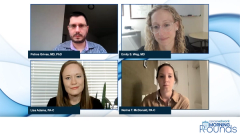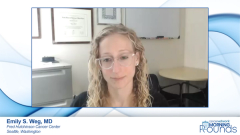
Followup With Patients on Maintenance Therapy for Bladder Cancer
A brief discussion on optimal follow-up practices with patients on therapy for advanced bladder cancer.
Episodes in this series

Transcript:
Petros Grivas, MD, PhD: And then, the other question that comes up [is] we scan them every 2 months initially, and if they do great, at some point we switch to every 3 months. Is that the same practice, Lisa? And the second question is: How long do you continue avelumab maintenance?
Lisa Adams, PA-C: Yes, so we do like to scan them every 2 to 3 months initially. If people are doing well and have been on therapy for quite a while, we might graduate them out a little less often. Depends on patient preference, as well, and clinically how they’re doing. Generally, if avelumab maintenance is going well, we like to continue until progression, if that’s possible. Sometimes there can be toxicities that come up, requiring an interruption, perhaps a course of steroids. But fortunately, those instances are quite rare and not outside what we usually see with other immunotherapy agents. And if people have an exceptional response and maybe have had toxicity, then we might move into surveillance. But if the toxicity was quite manageable, and easily reversed, then we might continue on avelumab after discussion with the patient on risks and benefits.
Petros Grivas, MD, PhD: Thank you, Lisa. It’s always a discussion as you mentioned, individualized, and remember we have this discussion with many patients, and we tend to discuss every 2 months, maybe 3 months. And then the patient asked, “Do I keep coming in every 2 weeks forever?” Is this a commitment and treatment burden long term? And I tend to respond that it’s definitely important to recognize the frequency of visits every 2 weeks, [that] that’s how the trial was designed. We don’t have good data with longer intervals, but we try to keep it like that as much as possible.
And then the question, [to your point,] is: How long do you continue? The trial was designed until progression or acceptable toxicity. In that context, we always have a discussion if someone is 1 year or 2 years out, which is an outlier because most cases may have progression at some point. If they’re 2 years out and you have a complete response, could you stop treatment? We have no data. It’s a data-free zone, it’s a data gap. And we have this discussion with the patient in that context. The design of the trial was to continue; we don’t know what to do. And sometimes we make certain decisions with the patient. Some patients may say, “Give me a break.” Some others say, “I’m worried—keep me going.” So it’s interesting. Nerina, [do you have] any comments on that? I think we have a few patients reaching that time point, and some of them may want to continue.
Nerina T. McDonald, PA-C: Right. I think it’s definitely a patient-by-patient, case-by-case scenario and what the patient feels comfortable with and how much of a burden coming into clinic is for them, etc.
Petros Grivas, MD, PhD: Absolutely. It’s an ongoing discussion with the patient. And as patients go through [treatment], they do well, they get more used to it, and they’re encouraged that they have no progression.
Transcript edited for clarity.
Newsletter
Stay up to date on recent advances in the multidisciplinary approach to cancer.







































